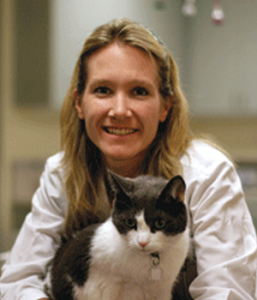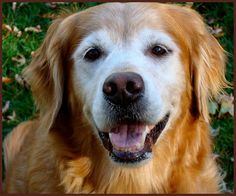-
Adopt
-
Veterinary Care
Services
Client Information
- What to Expect – Angell Boston
- Client Rights and Responsibilities
- Payments / Financial Assistance
- Pharmacy
- Client Policies
- Our Doctors
- Grief Support / Counseling
- Directions and Parking
- Helpful “How-to” Pet Care
Online Payments
Emergency: Boston
Emergency: Waltham
Poison Control Hotline
-
Programs & Resources
- Careers
-
Donate Now
 Lisa Maciorakowski, DVM
Lisa Maciorakowski, DVM
angell.org/generalmedicine
617-522-7282
Due to improved veterinary care, better nutrition, and education, our pets are living longer than ever before and, more often than not, they are getting a chance to experience life as an “older” animal. Cats and small dogs are considered to reach this older stage of life around seven years of age, while large dogs are considered to reach this older stage of life even sooner, around five to six years of age. There is a lot that can be done to keep our furry friends healthy and to allow them to age with peace and grace during this life transition. Older pet care considerations include an increase in frequency of veterinary care and monitoring, re-evaluating diet and nutritional needs, weight control, maintaining mobility and mental health and ensuring comfort through environmental accommodations.
As pet owners, our daily interactions with our pets allow us to serve a critical role in detecting signs of disease. Do not assume changes in behavior (such as increased vocalization, disorientation, increased irritability, anxiety, wandering, house soiling, etc.) are necessarily normal aging changes. While that may be the case, a change in behavior may also be an indicator of disease. Therefore, it is important to rule out possible underlying medical issues first. Any changes in personality, sleep cycles, or other behaviors should be noted to the veterinarian. Before assuming these are aging changes, some things that we would want to rule out are thyroid conditions, primary neurologic issues, arthritis or other sources of discomfort. For example, while an old dog may just simply need to be let out more frequently to eliminate, it is important to rule out a urinary tract infection (UTI) or other urinary issue. If a behavioral component is confirmed through a diagnosis of exclusion, we must sometimes adjust our interactions with our pets, and become accepting of things like new “grouchy” behavior or changes in their preferences.
While annual “wellness” veterinary visits are important throughout an animal’s lifetime, they are especially important during their senior years. Older pets should ideally be examined on a semi-annual basis or more often depending on any medical issues. Animals can develop many of the same problems as older people such as cancer, heart disease, kidney/urinary disease, liver disease, joint/bone disease, senility and weakness. In addition to those previously noted behavior changes, common warning signs of disease in older pets include decreased appetite, increased thirst, change in urine volume, poor hair coat, vomiting, sore mouth, elimination accidents, cough or exercise intolerance. A physical examination and blood work can often catch some of these chronic medical issues at early stages. Sometimes a diagnosis can be made even prior to the development of any symptoms, and thereby allow for intervention and possibly the ability to slow progression of certain disorders. If an animal is on medications it’s important to follow the recommended follow-up/monitoring for improvement or side effects.
Other considerations specific to older animals are the vaccine and parasite control regimens. Good parasite control should be continued as animals age since their immune systems are not as strong and they may be more susceptible to infection. As pet owners, we should discuss our pet’s optimal vaccination schedule with the vet based on the animal’s medical situation and environment.
Good oral hygiene is also important and should be implemented throughout the animal’s lifetime. But despite all efforts, animals will still often have significant dental disease by the time they are older. Periodontal disease can be a “hidden” discomfort that should be addressed if possible. It’s important to know that most animals with even severely affected teeth will eat through the pain. A thorough oral evaluation is required for assessment and a dental procedure may be recommended.
 It is also important to discuss diet options with the veterinarian. While some animals can benefit from “senior diets” others may benefit from a prescription diet (such as kidney or weight control) determined by their medical condition. A slim body condition is especially important as an animal ages to alleviate any extra burden for older, likely arthritic joints. Work with your veterinarian to make sure your pet is at his/her ideal body condition and discuss the possibility of joint or omega fatty acid supplements.
It is also important to discuss diet options with the veterinarian. While some animals can benefit from “senior diets” others may benefit from a prescription diet (such as kidney or weight control) determined by their medical condition. A slim body condition is especially important as an animal ages to alleviate any extra burden for older, likely arthritic joints. Work with your veterinarian to make sure your pet is at his/her ideal body condition and discuss the possibility of joint or omega fatty acid supplements.
We assume that most, if not all, animals will develop some degree or form of arthritis as they get older. Some signs of arthritis are favoring a limb, difficulty standing/sitting, increase in sleep, acting stiff, hesitancy to run/jump/climb stairs, decreased activity or interest in play, attitude changes or elimination accidents. It should not be assumed that they are “just old” and that their condition should be accepted without intervention. Work with your vet on a pain control program specific for your pet or discuss the possibility of working with a pain specialist. There are options for treatment that include harnesses, physical therapy, water therapy, massage, and acupuncture to be used in conjunction with various classes of pain medications.
As our older animals slow down and decrease in mobility, environmental considerations should be employed to make it easier to allow our older friends to get where they want to go. Stairs or ramps can be used for easier access into beds, cars or favorite sunny spots. Litter boxes may need to be designed for easier access. Raised feeding platforms and orthopedic beds can assist some as well. As cats age they often can’t or don’t groom as well and their nails tend to grow faster and longer. For these reasons it is important to trim their nails, and to give them some extra brushing. They also love their warm cozy spots more than ever so it’s important to make sure that those are plentiful and that they have easy access to them.
In much the same way as for humans, it is important to continue to stimulate both the mind and body as the animal ages. It is important to continue walking, running or swimming or playing according to their body’s tolerance. But just like us, they may need to alter their exercise routine to be more appropriate for their current body condition/life stage. Also, we should not underestimate the significance of plentiful human and animal interaction in preserving good mental health. New games can be implemented too, such as food mazes, to allow them to continue to learn. If you are concerned that your pet may be suffering from some cognitive dysfunction, talk to your vet about diets, supplements and special activities that will stimulate the mind.
Together we, as observant animal owners, along with the professional eye of the veterinarian, can help assess a pet’s comfort level and their quality of life. Since animals are blessed with the inability to be sad about the fact that they are aging and maintain the ability to live in the moment, our goal is to ensure that that they are allowed to experience as much pleasure and enjoyment as possible during this special time of their lives. While aging is inevitable and we must accept the changes in our animals that accompany it, we should be encouraged that there is much that can be done to keep our elderly friends happy, healthy and comfortable as they enter the senior part of their lives’ journey.
For information about Angell’s General Medicine service, please visit www.angell.org/generalmedicine or call 617-522-7282.
